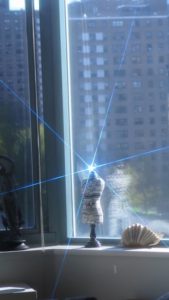 “I had to whip out my camera the moment I saw a blue star zinging out of the crystal on top of my French store dummy…
“I had to whip out my camera the moment I saw a blue star zinging out of the crystal on top of my French store dummy…
Then EVERYTHING was trembling in a state of grace…
No one’s out in the street.
But INSIDE our treasures are coming to life.
As are WE… perhaps!”
So read an enthusiastic email from playwright Tina Howe when we asked her some months ago, along with several playwrights who’ve been published by TCG Books, what plays they have turned to for succor, for wisdom, for comfort during this time of lockdown and protest and reconsideration. Here’s what they told us.
Will Arbery

You ask which plays keep coming back to me. That list includes Far Away by Caryl Churchill, The Designated Mourner by Wallace Shawn, Fefu and Her Friends by Maria Irene Fornes, Lion in the Streets by Judith Thompson, You for Me for You by Mia Chung, People Without History by Richard Maxwell…Those are the ones that spring to mind first. All of them, I think, united by their willingness to coil around something dark, play with time, and live in an in-between space.
Anne Bogart

I avoid reading plays whenever I can. I love reading and I love reading mostly nonfiction, of course performance theory, history, biography, science, essays, travel writing, and much more. I read some fiction but I avoid reading plays because they demand such a slow reading, an investment of time and imagination. I cannot simply read a play—rather I have to study a play, slow down, savor, imagine.
That said, I did a very slow read of Thornton Wilder’s The Skin of Our Teeth with SITI Company over Zoom and have come to the conclusion that it is the most appropriate play for our times. Right now! I am very excited about that play.
As for other reading, I read nonfiction, and here are the books that have been occupying my COVID times: Zadie Smith, Intimations; Toni Morrison, The Source of Self-Regard; Slavoj Žižek, Pan(dem)ic!; Helen Macdonald, Vesper Flights; Jenny Odell, How to Do Nothing; Priya Parker, The Art of Gathering; David Adjmi, Lot Six; Laszlo F. Foldenyi, Dostoyevsky Reads Hegel in Siberia and Bursts Into Tears; Kurt Anderson, Evil Geniuses: The Unmaking of America; Arundhati Roy, The End of Imagination; Kay Ryan, Synthesizing Gravity—Selected Prose.
André Gregory

As to go-to plays to which I turn all the time, I would say Hamlet, Lear, The Designated Mourner, Grasses of a Thousand Colors.
Tina Howe
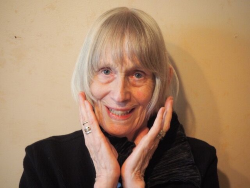
As usual, I’ll be the one who veers completely off track in what you’re looking for. I haven’t been reading during this lock down, but WRITING! (I stopped from 2018 until now, since we had to sell our apartment, find a buyer, downsize, find a new apartment and move, set up a new household and while looking after my husband, who was diagnosed with Alzheimer’s back in 2013!)
So, now that we’re all settled in and in lockdown, I can return to writing, not reading. Which is fantastic! So, what have I written? A take-off of Waiting for Godot for an upcoming 10-minute-play contest at the Red Bull, called Waiting for Red Bull…And now a children’s picture book with a great photographer on board, telling the story (my story) of how a sad, dreamy, tall little girl (who’s been named Longfellow by her academic parents) grows wings and flies away.
But to answer your question about the plays that have come back to me during this tumultuous time: always The Bald Soprano (since I translated it and had it published by Grove Press); Waiting for Godot, since I wrote a 10-minute version of it, and was very moved by the speech Sarah Ruhl gave at the Whiting Awards a month ago, when she famously said:
“Write for God. The cave. The envelope.”
I had those words engraved by Etsy in four dainty silver bracelets for Sarah, me and two female playwright friends.
Quiara Alegría Hudes

I miss the sidewalk. I miss the noise and clatter and music of el barrio. So to me, Stephen Adly Guirgis plays are a way to pretend I’m walking out among the joyous, ribald, crazy-ass noise of my favorite corners.
Though much of it is, admittedly, boring, I am forever enthralled by The Winter’s Tale by Shakespeare, for having one of my favorite theatre moments ever. (Spoiler alert!) When that statue comes to life—that is how I’ll feel when we can un-pause life, un-freeze our isolated souls, and physically manifest our love once again.
My family took a hike and got caught in the rain. We ran for cover and as we waited for the rain to pass, we told more and more outlandish real stories from our lives. I thought of Jerusalem and Johnny “Rooster” Byron’s tall tales. And also of our collective receding wilderness…
Finally, I miss community. I had begun hosting a Latina artists group, a space of wellness. The social distancing halted that. But I think of Fairview, the space that play carves out. An invitation to togetherness.
Stephen Karam

I have mostly been lost in short stories by Alice Munro (she is the master of staring unsentimentally at the complexities of human relationships—for her nothing is absolute—and in a time of political divisiveness I find that skill to be an amazing comfort). I have also been spending time with two plays by contemporary voices I love: John by Annie Baker and Is God Is by Aleshea Harris. Both plays hold familiar ideas about God and love and relationships but turn them on their head in such strange and surprising ways they feel brand new again.
Adrienne Kennedy
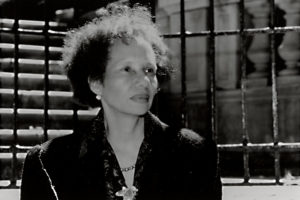
I rely always on:
The Glass Menagerie.
A Streetcar Named Desire.
Hamlet.
Julius Caesar.
The Pajama Game.
The Music Man.
The Seagull.
The Diary of Anne Frank.
Reading. And listening.
To get lost. In.
And
More listening:
Lost in the Stars
La Bohème.
Young Jean Lee

For me, the play that comes to mind again and again is Adrienne Kennedy’s Funnyhouse of a Negro. I tried making a longer list but it just started getting too out-of-control-long too quickly, and I think Funnyhouse kind of encapsulates a lot for me right now.
Craig Lucas
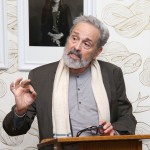
The play that keeps running through my mind during all this is Thornton Wilder’s The Skin of Our Teeth. In each act humanity faces another cataclysm and each time humanity comes through. It was the first “grown-up” play I fell in love with in youth, and it is the play that remains most meaningful for me.
Martyna Majok
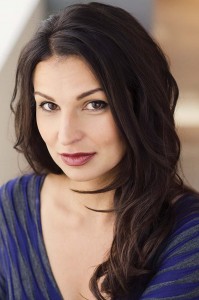
Here are some of my favorite plays and playwrights (and social-media-postable write-ups):
The Weir is my absolute favorite play. I love Conor McPherson. Other awe-inspiring plays of his that I especially love are The Seafarer, Shining City, and The Night Alive, but I always, always return to The Weir. I read it probably once a year and my heart swells every time.
Similar to Conor McPherson, anything Dominique Morisseau writes is magic. Both Conor and Dominique write with clear eyes and full hearts. You can feel the love with which their characters are written. Skeleton Crew is my favorite of her many beautiful plays. She nourishes my soul.
Intimate Apparel by Lynn Nottage is stunning. A master class in both heart and craft.
Fun Home by Lisa Kron and Jeanine Tesori is masterful. As with Lynn’s Intimate Apparel, Fun Home is also a master class in both heart and craft.
The Band’s Visit by Itamar Moses and David Yazbek. The yearning! The humor! And the music!
Angels in America. Because: brilliance. Because: master. Because: love and lift and humor and agony. Because of those characters and that scope.
Like Dominique Morisseau, Samuel D. Hunter writes with clear eyes and deep love for his characters. And like Dominique and Lynn, he writes generous, rich roles for actors. Lewiston is beautiful. As are The Whale and A Bright New Boise.
Anything by August Wilson. Everything by August Wilson.
Emily Mann
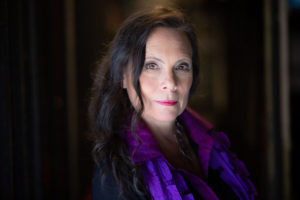
As to what I am reading—what plays. It is interesting—I am reading Shakespeare again! 1606, a plague year, was the year of King Lear, Antony and Cleopatra, and Macbeth. They are my three favorites, along with Midsummer, and I am reveling in them again, reading them aloud, and planning a production of Lear. It also inspires me to know he most probably wrote them in quarantine. I am writing so much that I am ashamed to say I am not reading the plays of my contemporaries right now. I am reading poetry— especially the poems of my dear friend, the great late C.K. Williams. His sensibility is perfect for this moment. And I am rereading Joyce Carol Oates’s Blonde. This isn’t at all what I would have expected I’d be reading, but this is the truth. Perhaps it is because I am writing. And perhaps it will change…
Donald Margulies
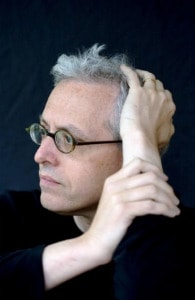
I honestly haven’t been able to focus on my own writing during this crisis (but I am collaging up a storm and taking pleasure in its escape properties). Yale’s Beinecke Library asked me to talk about being creative during the pandemic and posted this short video.
At the top of my list, always, is Our Town. I free-associated the following, then alphabetized them. Many (but not all) of these are plays I have on my syllabus and take pleasure rediscovering each year through the eyes of my students. Twentieth and 21st-century English-language plays, mostly; and, whaddaya know, many are published by TCG.
Our Town. Thornton Wilder. (The HarperCollins edition includes my introduction, which best expresses my love for the play.)
And everything else that came to mind, in alphabetical order:
Actually by Anna Ziegler
Angels in America by a guy named Tony Kushner
The Antipodes by Annie Baker
Appropriate by Branden Jacobs-Jenkins
Aunt Dan and Lemon by Wallace Shawn
Caught by Christopher Chen
Dance Nation by Clare Barron
Eurydice by Sarah Ruhl
Fairview by Jackie Sibblies Drury
Far Away by Caryl Churchill
The Great Leap by Lauren Yee
How I Learned to Drive by Paula Vogel
Intimate Apparel by Lynn Nottage
Mary Jane by Amy Herzog
Mr. Burns, a post-electric play by Anne Washburn
Uncle Vanya by Chekhov (there are many fine adaptation/translations out there, but my favorite is still David Mamet’s, and Louis Malle’s film of that text, Vanya on 42nd Street, is one of my all-time favorite movies)
The Wolves by Sarah DeLappe
Yellow Face by David Henry Hwang
Richard Nelson

I don’t think I’ve gone a week for years and years without reading something by Chekhov, or rather, I should say, by this time, rereading. He is the writer who inspires me the most—a writer I turn to both as playwright and human being, in order to understand my craft, this art form, and sometimes just my life. In the past couple of weeks I have read my friends the Pevears’ translation of Chekhov’s Fifty-Two Stories, just published by Knopf. A magnificent collection; literally half of these stories I had not read before. They come from all times of his life, youth to the end. They are funny, human, humane, silly, stark, and profound. I would recommend anyone to just dip in. The pleasures are endless.
I’ve been dipping into Chekhov for years, and nearly 30 years ago I began to study his plays in great detail, and to “translate” them via literal translations, as I speak no Russian. Some of these were commissions, and so had productions, often beautiful productions. However, a little over 10 years ago, I set these all aside and began again. I approached Richard Pevear and Larissa Volokhonsky, the two most admired translators of classical Russian prose into English alive today, suggesting that the three of us collaborate on translations of Russian plays. Translating plays, I suggested, is a different art than translating prose, and so a playwright’s eye could be helpful. They quickly agreed, and so we began a project of translating a Russian play every year. TCG became the publisher of this project.
We dipped our toes in with a Turgenev and then a Gogol and two Bulgakovs before setting our sites on what was our real ambition: the plays of Chekhov. We translated The Cherry Orchard—in two versions, as we discovered that there had been many changes made to this great play while in rehearsal, changes which, to this playwright’s eye, were actually detrimental to the play. So we translated and TCG published a volume with both versions, there now for all to compare. We did Uncle Vanya, which I then directed both in San Diego and New York; we did The Seagull, Three Sisters, and last year Ivanov, which is the next book to be published on our TCG assembly line.
This year, before the virus struck, we’d scheduled to meet right now, in early May, to work on our new translation of Chekhov’s one-acts for a commission by the Alley Theater in Houston. A month ago the Pevears delivered their first draft; my notes would be generated from this, and then we would have met in person, working long sessions, in the most thrilling collaboration I have ever experienced. What I haven’t said is that the Pevears are married and live in Paris, and so that is where I have had to go each year and spend a month as we worked. A bit of a bonus, to be sure!
But now we need to wait like the world waits; to work over something like Zoom would not feel right, I think. We need to be together; to talk to each other, interrupt each other, argue, discuss, and laugh. So we’ll wait. Knowing that in time, we will be back at their dining room table in Paris, and working together on the most amazing plays I have ever known.
Robert O’Hara

Plays I’m reading and would love folks to check out are A Streetcar Named Desire and Sweet Bird of Youth, or really any of Tennessee Williams’s plays, which are so rich and dynamic and all have a legend to their creation. Also I love the work of the newly Pulitzer Prize-winning playwright Michael R. Jackson, and especially in view of this virus I’m excited to revisit Tony Kushner’s Angels in America. I’d also recommend anything by Suzan-Lori Parks, Lorraine Hansberry, or Adrienne Kennedy. I could go on with a whole host of new and exciting playwrights but I’ll stop there…
Dael Orlandersmith

So—the plays:
A Long Day’s Journey into Night
Fences
The Belle of Amherst
Ruined
Short Eyes
Anna in the Tropics
For colored girls…
JT Rogers

During these strange and roadmap-less times, these are the plays I’ve either reread of late and keep thinking about and am about to reread:
Julius Caesar
Mr. Burns, a post-electric play by Anne Washburn
Mad Forest by Caryl Churchill
Our Town by Thornton Wilder
Saved by Edward Bond
A Map of Virtue by Erin Courtney
The Designated Mourner by Wallace Shawn
Sarah Ruhl

I’ve been slowly rereading King Lear.
During this time—something about the scale feels appropriate…
Also rereading Greek tragedy—Anne Carson’s translations, in a volume called Grief Lessons.
And James Shapiro’s Shakespeare in a Divided America.
Some new TCG titles I’m particularly excited about:
Julia Cho’s The Language Archive and other plays and Fairview by Jackie Sibblies Drury.
How could I not be interested to see how these brilliant writers denote their theatricality on the page?
Christopher Shinn

In difficult times, I’m always struck by how the greatest playwrights embrace apocalyptic tensions in their plays. The world Caryl Churchill created in Far Away feels like ours today—humans are so violent that we’ve infected and weaponized nature itself. In his most famous works, Beckett explored our passivity in the face of a stupid, brutal reality. In King Lear, Shakespeare staged the horrors of narcissism when it is buoyed by power. O’Neill’s late plays, especially The Iceman Cometh, dramatized how we use delusion as protection against painful truths. These writers remind me that we live in a world of oppression, madness, and despair—necessary insights in a culture that denies the tragic.
Michael Weller
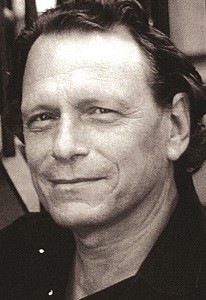
When my thoughts lean toward anything to do with my avocation (theatre), it’s always the Big Questions: What’s the purpose of theatre, again? Who was it being made for in this day and age of too-expensive elitist fare? How will theatres settle into a new normal? What can we do to help make it better? You get the idea—useless woolgathering, unrelated to the clarity and specificity we need to make plays of any merit.
I’d love to offer solace, but…
One book does haunt me. I’ve read it countless times, and hope to read it again as soon as my mind clears. It’s about people surviving the mental infection of Nazism, and tells a story of Berliners being entirely themselves: heroic, small, frightened, brave, and misguided while life moves inexorably forward (or maybe swirls in circles) around them. For what it’s worth, if you can concentrate on a book, Hans Fallada’s novel Every Man Dies Alone (also called Alone in Berlin) is what seems exactly right for this moment.
Lauren Yee

Guards at the Taj
Jerusalem
Five Flights
Sixty Miles to Silverlake
August: Osage County
God’s Ear
Small Mouth Sounds
An Octoroon
The Wolves
Much Ado About Nothing


